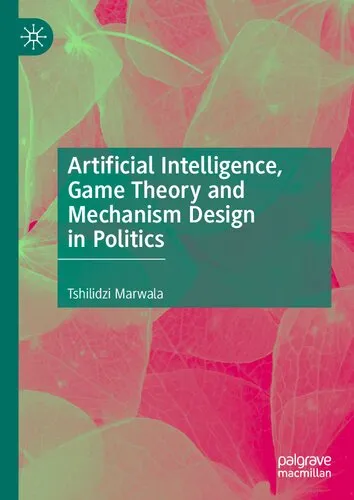Artificial Intelligence, Game Theory and Mechanism Design in Politics
4.5
Reviews from our users

You Can Ask your questions from this book's AI after Login
Each download or ask from book AI costs 2 points. To earn more free points, please visit the Points Guide Page and complete some valuable actions.Introduction to 'Artificial Intelligence, Game Theory and Mechanism Design in Politics'
Welcome to the intricate world of political decision-making, where science, strategy, and technology converge to shape societal outcomes. My book, 'Artificial Intelligence, Game Theory, and Mechanism Design in Politics', explores the dynamic interplay between these fields and investigates how they can revolutionize our understanding of political systems. As the digital era continues to evolve at an unprecedented pace, understanding these interdisciplinary concepts becomes essential to address the challenges of modern governance.
The 21st century presents a unique fusion of opportunities and crises. From international diplomacy to domestic policy, the mechanisms that drive decision-making require enhanced precision, fairness, and adaptability. This book not only introduces artificial intelligence (AI) and game theory but also delves into mechanism design—a critical tool for creating actionable frameworks within political systems. By blending theoretical insights with practical applications, this book serves as both a scholarly resource and a guide for policymakers, academics, and enthusiasts eager to understand the convergence of data, strategy, and governance.
Detailed Summary of the Book
At its core, this book seeks to demystify the ways artificial intelligence, game theory, and mechanism design can illuminate complex political landscapes. It begins by providing a primer on the foundational principles of AI, highlighting its evolving role in decision-support systems and predictive analytics in politics. The discussion then advances to game theory, a mathematical framework for understanding interactions where multiple entities seek to maximize their respective outcomes. Finally, the concept of mechanism design is interwoven as a means to proactively structure systems where desired political outcomes can be achieved.
The chapters progress through real-world case studies, demonstrating how these frameworks are applied to tackle problems like voting systems, public policy optimization, international negotiations, and combating misinformation. The book illustrates how AI-powered models can simulate possible futures, enabling policymakers to make informed decisions under conditions of uncertainty. Readers will also gain insight into how strategies, often employed in games, can predict or influence the behavior of political stakeholders in tangible ways.
By the conclusion, the book discusses ethical concerns and the need for human oversight in political applications of AI. The focus remains on ensuring accountability, fairness, and transparency, as these technologies steadily permeate governance structures worldwide.
Key Takeaways
- Understanding the principles of artificial intelligence and its applications in political decision-making.
- Learning the role of game theory in predicting and influencing political outcomes.
- Exploring mechanism design as a tool for creating fair and efficient political systems.
- Analyzing real-world case studies where AI and strategic thinking have been applied to governance.
- Navigating critical ethical considerations in the use of intelligent systems in politics.
Famous Quotes from the Book
"Artificial intelligence is not merely a tool; it is a mirror reflecting the complexities of human judgment and decision-making within political structures."
"The beauty of mechanism design lies in its foresight, structuring rules that ensure justice and efficacy even in the face of competing interests."
"When strategy meets science, we unlock a potential to not only understand political behavior but to design frameworks that aspire for a more equitable world."
Why This Book Matters
In a world increasingly influenced by digital transformation, understanding the nexus of AI, game theory, and mechanism design in politics is not just academic—it is imperative. This book recognizes the pressing need for innovative solutions to combat the world's most significant political challenges, including corruption, polarization, and resource allocation. By equipping readers with advanced analytical concepts and practical insights, the book empowers them to critically engage with these challenges.
This book matters because it bridges the gap between theory and practice in governance. Whether you are an academic looking to expand your research horizons or a policymaker striving to make data-informed decisions, the knowledge and methodologies presented here are transformative. It proposes a vision for the future where governance is driven by fairness, efficiency, and the intelligent integration of human values with advanced technologies.
Free Direct Download
Get Free Access to Download this and other Thousands of Books (Join Now)
For read this book you need PDF Reader Software like Foxit Reader


